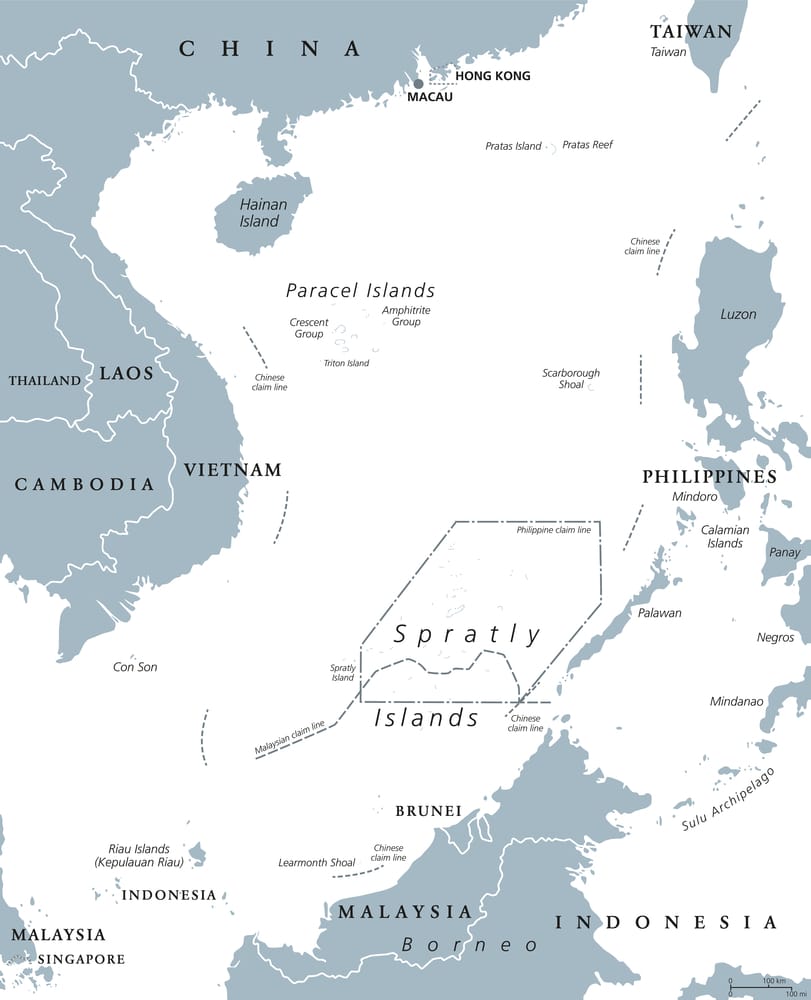News from Southeast Asia this morning was that the Joe Biden administration was again rattling its saber over incidents between the Philippines and China in the South China Sea. At issue are some spits of sand thousands of miles from the United States. Just as a refresher for those Americans who, rightly, have no idea what or where the Scarborough or Second Thomas Shoal are (so irrelevant are they to American prosperity or security)…
The origins of the dispute between China and the Philippines over these miniscule spits of land in the South China Sea are based on conflicting claims over the territory. Beijing’s are based on ancient maps and documents it believes prove its sovereignty over the area, the so-called nine-dash line; while Manila, for its part, points to treaties and agreements signed during the colonial period when the Philippines was under Spanish and then American rule—among them, the 1898 Treaty of Paris and subsequently formulated Constitution of the Philippines, both of which included the shoals. Apart from being strategically located between China and the Philippines, they are home to rich fisheries and are likely to have significant reserves of oil and gas within their exclusive economic zone. As such, it is understandable why both Beijing and Manila are reluctant to concede their claims, and despite numerous efforts at doing so over the years, no resolution between the two has ever been reached.
Seeking to defend and strengthen its claim with a permanent armed presence, in 1999 Manila ordered the Sierra Madre purposefully run aground on Second Thomas Shoal, leaving the ship and a small contingent of men who are occasionally resupplied. It was actually attempted Chinese interference in such a resupply effort that sparked the most recent confrontation that the Biden administration issued its warning over.
Such incidents have been happening regularly since 2012, when Beijing began sending maritime surveillance vessels and large numbers of Chinese fisherman and members of its merchant marine into the area. When Manila attempted to arrest the Chinese for illegal fishing off Scarborough Shoal, Beijing dispatched more ships to block them, and a standoff ensued that was only brought to an end when the Philippines finally recalled its forces. Manila brought the dispute before the Permanent Court of Arbitration the next year, challenging the validity of China’s nine-dash line claim. And in 2016 the Court ruled in favor of the Philippines.
As one might expect, Beijing ignored this and has continued to assert its territorial claims with ever more vigor in the ensuing years. Incidents from the deployment of water cannons and laser lights to near collisions have been unfortunately frequent in the years since. And whereas under previous administrations Washington had been reluctant to explicitly state that the 1951 Mutual Defense Treaty between the United States and the Philippines applied to the disputed maritime areas in question, the Donald Trump administration sought to make these explicit during a 2019 visit by then-Secretary of State Mike Pompeo. At the time, the skeptical Duterte administration in Manila kept aloof. Unfortunately, the newly elected boss in Manila is Ferdinand Marcos Jr., son of long-time U.S. sock-puppet dictator Ferdinand Marcos. He has shown no such reluctance to go along with Washinton’s preferred policy of all out confrontation with China, going so far as to open new leases to U.S. naval assets in the Cagayan Province, located directly across from Taiwan.
Despite what the cheerleaders at the The Washington Post would have you believe, this is all completely crazy, and not at all defensive. Risk war with China over a couple piles of rock and sand so the Philippines can have some extra gas and oil, and the U.S. Navy can shove more assets in China’s face in preparation for the desired war over a breakaway province of China which Washington already officially acknowledges as part of China?
Come on.
The truth is this standoff between the Philippines and China is part of much larger, ongoing territorial disputes in the South and East China Seas, which involve multiple countries besides China and Philippines; for example, Vietnam, Malaysia, Brunei, and Taiwan. All of them want a taste of the likely natural resource wealth beneath the ocean’s floor, as well as the perceived security that comes from controlling the waters nearby.
There is probably going to be some amount of conflict.
The United States should not get involved.








